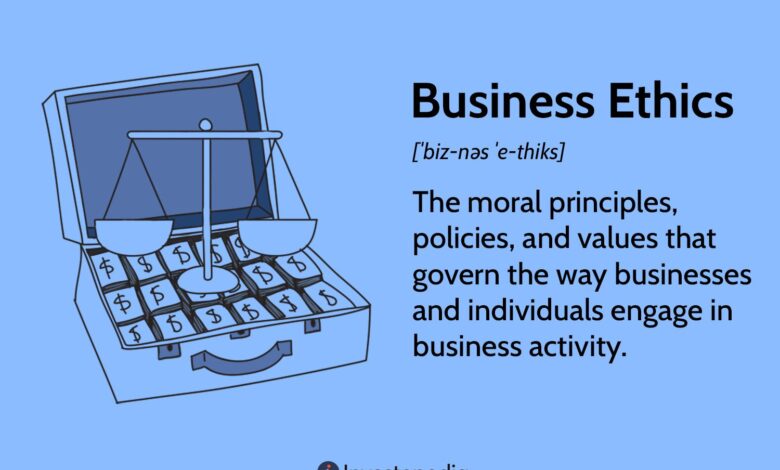Key Principles and Their Importance in Today’s Market

What Is Business Ethics?
Business ethics involves the moral principles guiding companies and individuals in the business world. These principles go beyond legal obligations, establishing a code of conduct that promotes trust and integrity at every level of a business. By understanding and implementing effective business ethics, companies can enhance their reputation, foster customer loyalty, and achieve long-term success.
Key Takeaways
- Business ethics are foundational principles that guide the behavior and decision-making of companies and individuals, promoting trust and fairness in business operations.
- Ethical business practices not only comply with legal standards but also enhance a company’s reputation, fostering customer trust, brand growth, and long-term success.
- A comprehensive understanding of business ethics includes a focus on leadership, accountability, transparency, and environmental concerns, among other key principles.
- Companies with strong ethics programs can better avoid scandals and legal issues, benefiting from increased customer and investor confidence.
- Corporate social responsibility is a crucial aspect of business ethics, as it emphasizes balancing stakeholder needs with a commitment to societal welfare and sustainability.
Investopedia / Katie Kerpel
Business Ethics: Building Trust and Fair Practices
Business ethics ensure that a certain basic level of trust exists between consumers and various forms of market participants with businesses. For example, a portfolio manager must give the same consideration to the portfolios of family members and small individual investors as they do to wealthier clients. These kinds of practices ensure the public receives fair treatment.
The concept of business ethics began in the 1960s as corporations became more aware of a rising consumer-based society that showed concerns regarding the environment, social causes, and corporate responsibility. The increased focus on “social issues” was a hallmark of the decade.
Since that time, the concept of business ethics has evolved. Business ethics goes beyond just a moral code of right and wrong; it attempts to reconcile what companies must do legally vs. maintaining a competitive advantage over other businesses. Firms display business ethics in several ways.
Important
Business ethics ensure a certain level of trust between consumers and corporations, guaranteeing the public fair and equal treatment.
Key Principles Driving Business Ethics
There are generally 12 business ethics principles:
- Leadership: The conscious effort to adopt, integrate, and emulate the other 11 principles to guide decisions and behavior in all aspects of professional and personal life.
- Accountability: Holding yourself and others responsible for their actions. Commitment to following ethical practices and ensuring others follow ethics guidelines.
- Integrity: Incorporates other principles—honesty, trustworthiness, and reliability. Someone with integrity consistently does the right thing and strives to hold themselves to a higher standard.
- Respect for others: To foster ethical behavior and environments in the workplace, respecting others is a critical component. Everyone deserves dignity, privacy, equality, opportunity, compassion, and empathy.
- Honesty: Truth in all matters is key to fostering an ethical climate. Partial truths, omissions, and under or overstating don’t help a business improve its performance. Bad news should be communicated and received in the same manner as good news so that solutions can be developed.
- Respect for laws: Ethical leadership should include enforcing all local, state, and federal laws. If there is a legal grey area, leaders should err on the side of legality rather than exploiting a gap.
- Responsibility: Promote ownership within an organization, allow employees to be responsible for their work, and be accountable for yours.
- Transparency: Stakeholders are people with an interest in a business, such as shareholders, employees, the community a firm operates in, and the family members of the employees. Without divulging trade secrets, companies should ensure information about their financials, price changes, hiring and firing practices, wages and salaries, and promotions are available to those interested in the business’s success.
- Compassion: Employees, the community surrounding a business, business partners, and customers should all be treated with concern for their well-being.
- Fairness: Everyone should have the same opportunities and be treated the same. If a practice or behavior would make you feel uncomfortable or place personal or corporate benefit in front of equality, common courtesy, and respect, it is likely not fair.
- Loyalty: Leadership should demonstrate commitment to their employees and the company. Inspiring loyalty in employees and management ensures that they are committed to best practices.
- Environmental concern: In a world where resources are limited, ecosystems have been damaged by past practices, and the climate is changing, it is of utmost importance to be aware of and concerned about the environmental impacts a business has. All employees should be encouraged to discover and report solutions for practices that can add to damages already done.
The Importance of Business Ethics for Modern Companies
There are several reasons business ethics are essential for success in modern business. Importantly, ethics programs set a code of conduct guiding personnel behavior, from executives to new employees.
When all employees make ethical decisions, the company establishes a reputation for ethical behavior. Its reputation grows, leading to benefits like:
- Brand recognition and growth
- Increased ability to negotiate
- Increased trust in products and services
- Customer retention and growth
- Attracting talent
- Attracting investors
When combined, all these factors affect a business’ revenues. Those who fail to set ethical standards and enforce them are doomed to eventually find themselves alongside Enron, Arthur Andersen, Wells Fargo, Lehman Brothers, Bernie Madoff, and many others.
Exploring Different Types of Business Ethics
There are various types of business ethics. What mainly makes a business stand out are its corporate social responsibility practices, transparency and trustworthiness, fairness, and technological practices.
Corporate Social Responsibility
Corporate social responsibility (CSR) is the concept of meeting the needs of stakeholders while accounting for the impact meeting those needs has on employees, the environment, society, and the community in which the business operates. Finances and profits are important, but they should be secondary to the welfare of society, customers, and employees. In fact, studies have concluded that corporate governance and ethical practices increase financial performance.
Fast Fact
A greater focus on business ethics is an expense that tends to pay off. Over time, it boosts revenues and limits damaging lawsuits.
Transparency and Trustworthiness
It’s essential for companies to ensure they are reporting their financial performance in a way that is transparent. This not only applies to required financial reports but all reports in general.
Most of these reports outline not only the submitted reports to regulators, but how and why decisions were made, if goals were met, and factors that influenced performance. CEOs write summaries of the company’s annual performance and give their outlooks.
Press releases are another way companies can be transparent. Events important to investors and customers should be published, regardless of whether it is good or bad news.
Technological Practices and Ethics
The growing use of technology of all forms in business operations inherently comes with a need to ensure the technology and information being gathered is used ethically. Additionally, it should ensure that the technology is secured to the utmost of its ability, especially as many businesses store customer information and collect data that those with nefarious intentions can use.
Fairness
A workplace should be inclusive, diverse, and fair for all employees regardless of race, religion, beliefs, age, or identity. A fair work environment is where everyone can grow, be promoted, and become successful in their own way.
Implementing Effective Business Ethics Practices
Fostering an environment of ethical behavior and decision-making takes time and effort and starts at the top. Most companies need to create a code of conduct/ethics, guiding principles, reporting procedures, and training programs to enforce and encourage ethical behavior.
Once conduct is defined and programs are implemented, continuous communication with employees becomes vital. Leaders should constantly encourage employees to report concerning behavior. Additionally, there should be assurances that whistle-blowers will not face adversarial actions.
Tip
A pipeline for anonymous reporting can help businesses identify questionable practices and reassure employees that they will not face any consequences for reporting an issue.
Effective Strategies for Monitoring and Reporting Unethical Behavior
To prevent and fix issues from unethical behavior, companies rely on managers and employees to report misconduct. But fear of retaliation, a common barrier in company culture, can stop reports of misconduct.
Published by the Ethics & Compliance Initiative (ECI), the annual Global Business Ethics Survey reaches out to thousands of employees in 42 countries about various ethics-related topics, including the strength of the ethics culture in their workplace, whether they have witnessed any misconduct where they work, and if their employer is making efforts to promote integrity.
According to the 2023 survey published in May 2024, 65% of employees observed at least one violation, and 72% reported it. Worryingly, 46% of these employees then went on to admit that they had been retaliated against for raising concerns.
Indeed, fear of retaliation is one of the primary reasons employees cite for not reporting unethical behavior in the workplace. ECI says companies should work toward improving their corporate culture by reinforcing the idea that reporting suspected misconduct is beneficial to the company. Additionally, they should acknowledge and reward the employee’s courage in making the report.
What Is Business Ethics?
Business ethics concerns ethical dilemmas or controversial issues faced by a company. Often, business ethics involve a system of practices and procedures that help build trust with the consumer. On one level, some business ethics are embedded in the law, such as minimum wages, insider trading restrictions, and environmental regulations. On another, business ethics can be influenced by management behavior, with wide-ranging effects across the company.
What Are Business Ethics and Example?
Business ethics guide executives, managers, and employees in their daily actions and decision-making. For example, consider a company that has decided to dump chemical waste that it cannot afford to dispose of properly on a vacant lot it has purchased in the local community. This action has legal, environmental, and social repercussions that can damage a company beyond repair.
What Are the 12 Ethical Principles?
Business ethics is an evolving topic. Generally, there are about 12 ethical principles: honesty, fairness, leadership, accountability, integrity, compassion, respect, responsibility, loyalty, respect for the law, transparency, and environmental concerns.
The Bottom Line
Business ethics play a crucial role in shaping the conduct of employees, fostering trust between companies and their customers, and ensuring accountability towards society and the environment. By embedding a comprehensive code of ethics, companies can navigate legal and moral complexities, bolstering brand reputation and financial performance. Ethical business practices not only establish trust and loyalty among stakeholders but also pave the way for long-term profitability and sustainable success. For business leaders, prioritizing ethical decision-making and corporate social responsibility is essential for achieving a competitive advantage and maintaining a positive organizational culture.
Source link




